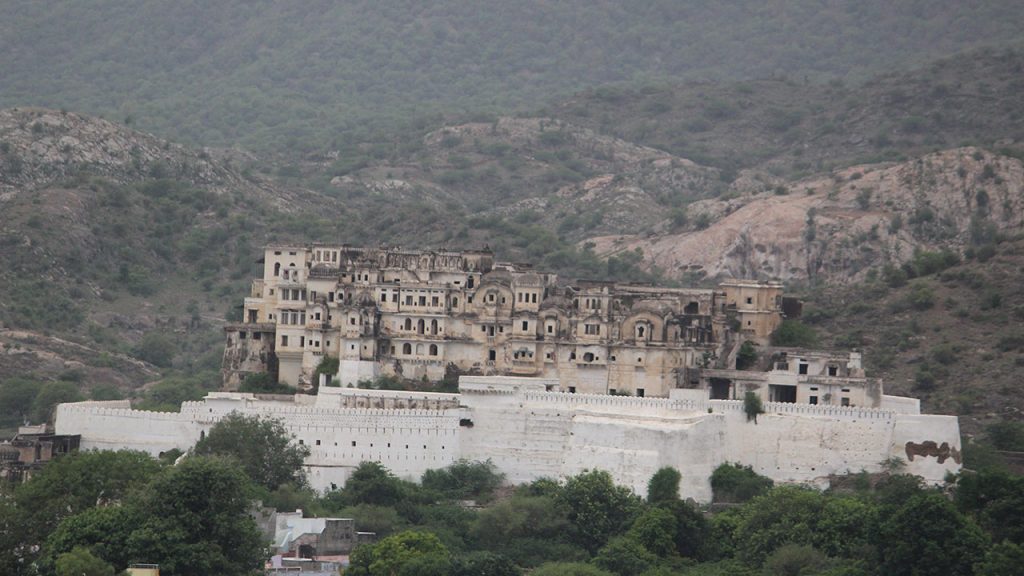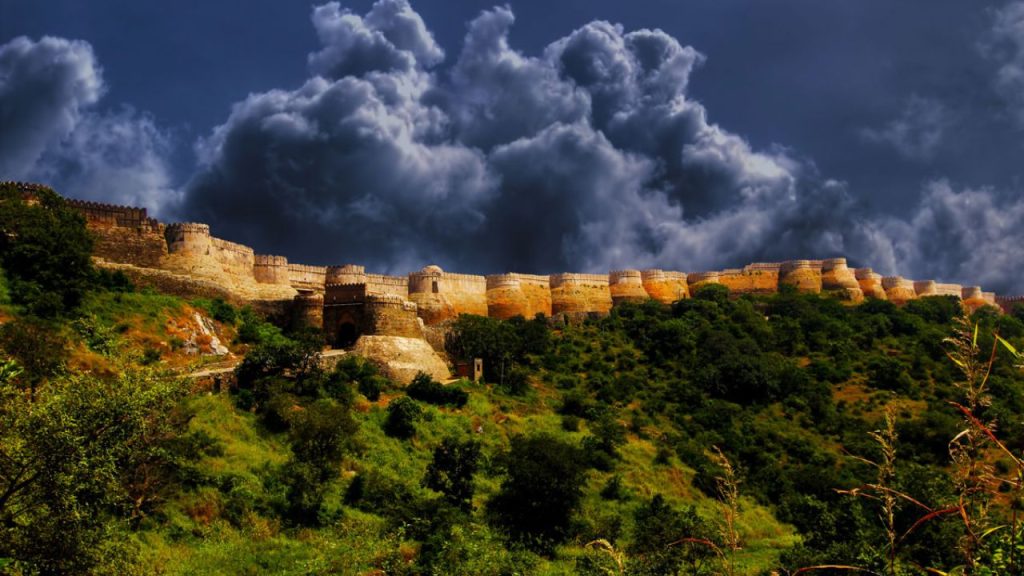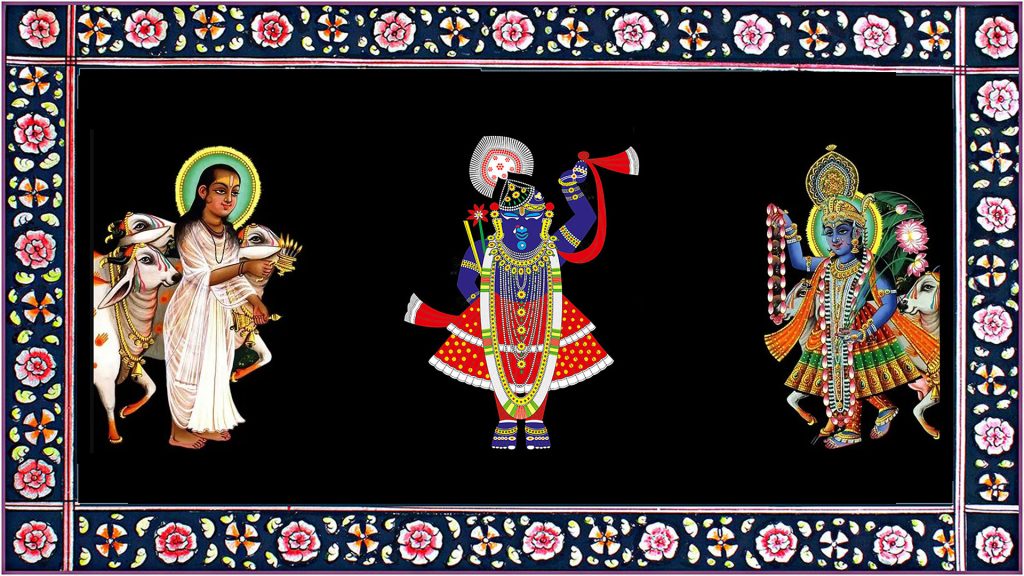Introduction
Brief overview of Bhilwara
Bhilwara, a vibrant and historically rich city located in the northwestern Indian state of Rajasthan, is a place where tradition and modernity converge seamlessly. Known as the “Textile City of India” and the “Manchester of Rajasthan,” Bhilwara has made a significant mark on India’s industrial map. With a population that embraces its cultural heritage and values, Bhilwara is a city that exudes warmth and hospitality.
The history of Bhilwara is a tapestry of princely states, traditions, and architectural wonders. It is a land where ancient forts and temples stand as testaments to the grandeur of yesteryears. The city’s strategic location, nestled amidst the Aravalli Hills, adds to its scenic beauty and offers a serene escape for nature enthusiasts.
Importance of Bhilwara as a Tourist Destination
Bhilwara’s textile industry is the lifeblood of the city, producing high-quality fabrics that are sought after not only in India but also globally. But Bhilwara is not just an industrial powerhouse. Its cultural diversity and vibrant festivals, like Holi and Diwali, reflect the rich tapestry of Indian traditions. Visitors are enchanted by the city’s colorful markets, where handcrafted textiles and traditional Rajasthani attire are proudly displayed.
Bhilwara, with its unique blend of heritage and modernity, is a captivating destination that invites exploration and promises a journey through history, culture, and industry. This introduction merely scratches the surface of what this remarkable city has to offer.
The Bhilwara Kings
Bhilwara is famous for its forts, natural wonders, textiles, and its cricket team, the Bhilwara Kings. The Bhilwara Kings is a franchise cricket team that plays in the Legends League Cricket (LLC), a professional T20 cricket league for retired and semi-retired legendary cricketers. The team is owned by the LNJ Bhilwara Group, a leading Indian textile conglomerate.
The Bhilwara Kings made their debut in the LLC in 2022. The team is led by former Indian all-rounder Irfan Pathan and features a number of other former international cricketers, including Naman Ojha, Matt Prior, and Owais Shah.
The Bhilwara Kings have a large and passionate fan base in Bhilwara and across Rajasthan. The team’s matches are always well-attended and generate a lot of excitement in the city. The Bhilwara Kings have also been successful on the field, reaching the playoffs in their debut season. At present, The upcoming match is scheduled is India Capitals vs Bhilwara Kings going to be held in Ranchi, Jharkhand on 18 November 2023.

Places to visit in Bhilwara
Badnore Fort
Badnore Fort is a historical gem that encapsulates the grandeur and mystique of the region’s rich heritage. Built during the 15th century, Badnore Fort is a striking example of Rajput architecture. Its imposing sandstone walls rise majestically from the arid landscape, creating an awe-inspiring sight. The fort is perched on a hill, affording panoramic views of the surrounding countryside, with its turrets and ramparts adding to the medieval charm.
Its interior is adorned with intricate frescoes, ornate mirrorwork, and colorful murals that tell tales of valor and romance. Visitors can explore the various courtyards, chambers, and battlements that once served as the stronghold of the Rajput rulers. Badnore Fort’s well-preserved state offers a glimpse into the royal lifestyle of yesteryears, making it a must-visit for history enthusiasts and tourists alike.
Pur Udan Chhatri
Pur Udan Chhatri, a magnificent architectural marvel is a true testament to the grandeur and opulence of Rajasthan’s royal heritage. This regal monument, also known as the “Chhatri of Maharaja Madho Singh II,” stands as a splendid example of Rajputana architecture.
The word “Chhatri” translates to “umbrella” in English, and the name perfectly encapsulates the essence of this structure. It features an ornate umbrella-like dome, crafted from intricately carved marble and supported by finely sculpted pillars. The Chhatri’s remarkable beauty is further accentuated by its vibrant colors, with the traditional pink and white hues of royal architecture.
Pur Udan Chhatri is a serene retreat nestled within a beautifully landscaped garden. Its tranquil ambiance invites visitors to immerse themselves in the historical and cultural richness of Rajasthan. Inside, the Chhatri houses a variety of ancient artifacts, paintings, and sculptures, offering a captivating glimpse into the opulent lives of the Maharajas.
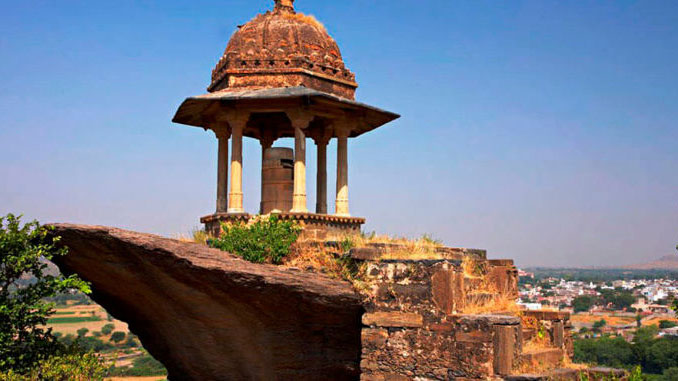
Kyara Ke Balaji
Kyara Ke Balaji is a quaint and charming village located in Bhilwara Rajasthan, India. This rural gem is nestled amidst the arid landscape of Rajasthan, offering a unique blend of traditional culture and natural beauty. The village is famous for its serene and peaceful ambiance, making it an ideal destination for those seeking a break from the hustle and bustle of city life.
One of the key attractions in Kyara Ke Balaji is the revered Balaji Temple, which draws pilgrims and tourists alike. This temple is dedicated to Lord Hanuman, a prominent deity in Hindu mythology, and is an important religious site for the local community. The temple’s stunning architecture, intricate carvings, and spiritual aura make it a must-visit destination for spiritual seekers and architecture enthusiasts.
The village is surrounded by picturesque landscapes and agricultural fields, offering visitors a glimpse into rural life in Rajasthan. The warm hospitality of the locals, coupled with their rich cultural traditions and folk art, makes Kyara Ke Balaji a culturally enriching experience. Travelers can explore the village, interact with the friendly residents, and immerse themselves in the vibrant local culture.
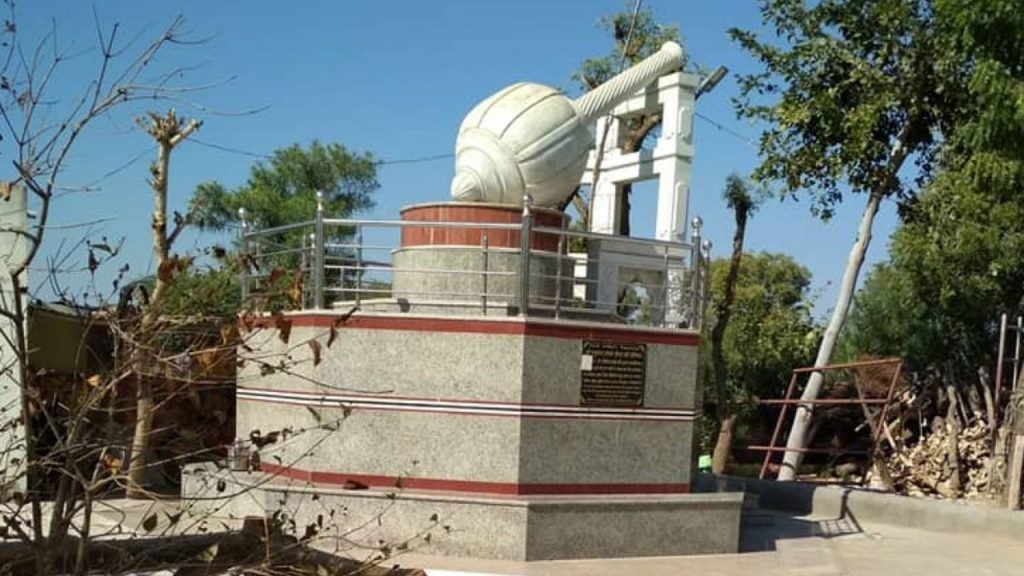
The Mahadev Gau Vigyan Anusandhan Kendra
The Mahadev Gau Vigyan Anusandhan Kendra, a renowned institution in India, is a center dedicated to the research and advancement of Gau Vigyan, or the science of cow-related studies. Founded with a profound reverence for the cow, a sacred animal in Indian culture, the center is a hub for interdisciplinary research, education, and the promotion of sustainable practices.
At its core, the Kendra focuses on the study of the cow’s integral role in agriculture, health, and the environment. It conducts extensive research on various aspects of cow science, including the medicinal properties of cow products like urine and dung, as well as the role of indigenous cow breeds in organic farming and biodiversity conservation.
The institution also emphasizes knowledge dissemination and education, hosting workshops, seminars, and training programs to educate the public and farmers on the practical applications of Gau Vigyan. Furthermore, Kendra actively promotes the conservation and breeding of indigenous cow breeds, highlighting their significance in ensuring ecological balance and sustainable agriculture.
In a world increasingly concerned with environmental sustainability and holistic well-being, the Mahadev Gau Vigyan Anusandhan Kendra plays a crucial role in bridging traditional wisdom with modern science, offering innovative solutions and insights for a harmonious coexistence with nature.

Mandalgarh
Mandalgarh is a historically significant town that encapsulates the rich heritage and architectural marvels of the region. Nestled amidst the rugged Aravalli hills, Mandalgarh offers a stunning blend of natural beauty and cultural significance.
The town is renowned for its formidable hilltop fortress, Mandalgarh Fort, which stands as a testament to the strategic prowess of its builders. Constructed in the 17th century by Raja Bhoj, this imposing fort played a pivotal role in the region’s history and witnessed numerous battles and rulers. The fort’s intricate architecture, with its towering walls and majestic gates, stands as a testament to the grandeur of Rajasthan’s Rajput heritage.
Surrounding the fort, Mandalgarh boasts a quaint town with narrow winding lanes, colorful markets, and bustling bazaars where one can immerse themselves in the local culture. The town is also famous for its vibrant festivals, with the Teej and Gangaur festivals being particularly significant, celebrating the spirit of Rajasthan with lively processions, traditional music, and dance.
Harni Mahadev
Harni Mahadev is a revered Hindu temple that holds a special place in the hearts of devotees and tourists alike. This sacred shrine is dedicated to Lord Shiva, one of the principal deities in Hinduism, and is renowned for its architectural beauty, spiritual significance, and the tranquility it offers to all who visit.
The temple is a captivating blend of traditional Rajasthani and architectural elements, featuring intricate stone carvings and ornate designs that reflect the rich cultural heritage of the region. The sanctum sanctorum houses a mesmerizing Shiva Lingam, the symbolic representation of Lord Shiva, which is the focal point of worship and devotion for countless pilgrims.
Harni Mahadev is not just a place of religious significance but also a serene retreat for those seeking spiritual solace and a break from the hustle and bustle of daily life. Surrounded by lush greenery and serene natural beauty, the temple complex provides a peaceful and meditative atmosphere that encourages contemplation and introspection.
Devotees throng to this holy abode throughout the year, but especially during the annual Maha Shivaratri festival when the temple comes alive with vibrant celebrations and religious rituals.

Dhanop Mataji Temple
Dhanop Mataji Temple is a sacred and culturally significant place of worship that encapsulates the rich spiritual heritage of the region. This ancient temple is dedicated to Mataji, a revered goddess in Hindu mythology, and it stands as a testament to the enduring devotion and faith of the local community.
The temple’s architecture is a mesmerizing blend of traditional Rajasthani design, characterized by intricately carved sandstone, ornate pillars, and exquisite frescoes that narrate tales of mythology and history. Dhanop Mataji Temple’s strikingly ornate and colorful façade is a true visual delight, making it a must-visit destination for travelers and devotees alike.
Visitors are drawn not only by the temple’s architectural marvel but also by the spiritual ambiance that envelops the complex. The air is filled with the soothing sounds of devotional songs and the sweet fragrance of incense. Devotees flock to this temple to seek blessings, offer prayers, and partake in religious festivals that are celebrated with great zeal and fervor.
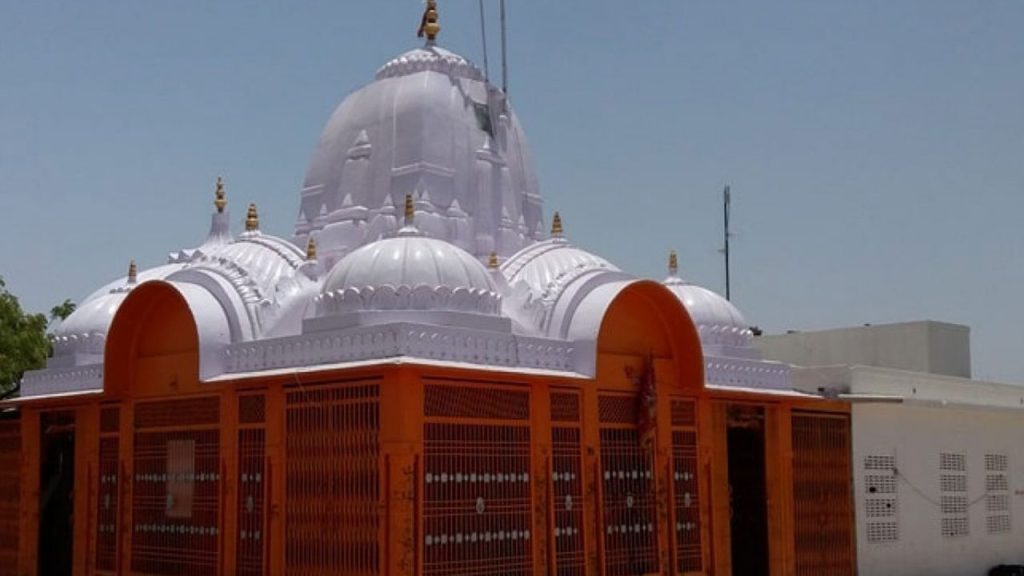
Shree Beed ke Balaji
Shree Beed ke Balaji is a revered and enchanting temple that holds a special place in the hearts of locals and devotees from far and wide. This sacred place of worship is dedicated to Lord Hanuman, a deity known for his unwavering devotion and strength.
The temple’s serene and spiritual ambiance, surrounded by lush greenery, invites visitors to experience a sense of tranquility and connection with the divine. Shree Beed ke Balaji is not just a religious site; it’s a cultural and architectural gem, boasting intricate designs and artwork that reflect the rich heritage of the region.
Devotees flock to this temple to seek blessings, offer prayers, and find solace in the presence of Lord Hanuman. The temple’s unique feature is a massive idol of Lord Hanuman, resplendent in his orange attire, exuding a sense of divinity and power. The temple hosts various religious and cultural events throughout the year, drawing devotees and tourists alike.
Shree Charbhuja Nath Temple
The Shree Charbhuja Nath Temple is a revered and ancient Hindu temple that holds great significance for the local community and pilgrims from across the country. This sacred sanctuary is dedicated to Lord Charbhuja, an incarnation of Lord Vishnu, and is known for its architectural splendor and spiritual ambiance.
The temple’s history dates back centuries, with its origins shrouded in myth and legend. Its distinctive architecture features intricate carvings and beautiful artwork that exemplify the rich heritage of Rajasthan. The main deity, Lord Charbhuja, is enshrined in the sanctum sanctorum and is adorned with opulent ornaments. The temple complex is a hub of spiritual activities and cultural events, especially during festivals like Janmashtami and Holi, when the temple comes alive with vibrant celebrations.
Surrounded by the serene and idyllic landscapes of Bhilwara, the Shree Charbhuja Nath Temple provides not only a place of worship but also a tranquil retreat from the hustle and bustle of daily life. Its spiritual resonance, architectural beauty, and cultural significance make it a must-visit destination for anyone exploring the rich heritage of Rajasthan.

Bagore Sahib
Bagore Sahib is a renowned Sikh shrine and a sacred place that holds immense historical and cultural significance for the Sikh community and the local population alike. The shrine is dedicated to Guru Granth Sahib Ji, the central religious scripture of Sikhism, and serves as a focal point for religious and spiritual activities.
The complex is characterized by its stunning architectural design, featuring white marble and intricate artwork that reflects the rich Sikh heritage. The main Gurudwara building, with its golden dome and ornate decorations, stands as a testament to the Sikh faith and its values of equality, community service, and spirituality.
Bagore Sahib hosts a continuous prayer service, which is open to people of all backgrounds and beliefs. Visitors can experience the melodious sounds of Kirtan (devotional singing) and partake in the community kitchen, known as Langar, which serves free meals to anyone in need. The sense of community and charity is a cornerstone of Sikhism and is beautifully exemplified here.
Chamunda Mata ji Mandir
The Chamunda Mata Ji Mandir in Bhilwara is a sacred Hindu temple dedicated to Goddess Chamunda, a revered form of the Goddess Durga, this temple is a place of deep religious significance and draws devotees and tourists alike.
The temple’s architecture is a testament to Rajasthan’s rich cultural heritage, featuring intricate carvings, ornate domes, and vibrant artwork. The temple’s sanctum sanctorum houses the idol of Chamunda Mata, adorned with traditional Rajasthani clothing and jewelry. The deity is depicted as a fierce goddess, often seen riding a tiger and holding various weapons.
Devotees visit the Chamunda Mata Ji Mandir to seek the goddess’s blessings for protection, strength, and well-being. The temple’s serene atmosphere and spiritual aura make it an ideal place for meditation and prayer. Throughout the year, special festivals and rituals are celebrated with great fervor, with Navratri being a particularly grand occasion.
Surrounded by picturesque landscapes, the temple offers breathtaking views of the Bhilwara cityscape. It serves as not only a religious center but also a cultural and architectural marvel, attracting visitors from all walks of life who come to admire its beauty and seek the divine blessings of Chamunda Mata.
Triveni
The place derives its name from the Triveni Sangam, a sacred confluence of three rivers – Menali, Bedach, and Banas – which adds a spiritual aura to the area. Triveni Bhilwara boasts a rich cultural heritage, with a tapestry of festivals, art, and architecture that reflects the essence of Rajasthan. The majestic Harni Mahadev Temple, with its intricate carvings and serene ambiance, stands as a testament to the city’s architectural prowess.
The city’s bustling markets are a treasure trove for shoppers, offering a wide array of textiles, handicrafts, and traditional Rajasthani jewelry. Triveni Bhilwara’s welcoming locals and hospitable atmosphere make it a delightful destination for travelers seeking an authentic experience in the heart of Rajasthan. Whether exploring its historic sites, partaking in cultural festivities, or marveling at the intricacies of its textile craftsmanship, Triveni is a place that seamlessly weaves the old and the new into a vibrant tapestry of experiences.

Meja Dam
Meja Dam, situated in the picturesque district of Bhilwara is a remarkable reservoir that blends natural beauty with practical utility. This imposing structure, also known as the Meja Barrage, stands proudly across the Banas River, serving as a vital water management system for the region.
The dam is a triumph of engineering and a lifeline for the surrounding areas. It was constructed primarily to provide irrigation and drinking water to the arid regions of Bhilwara and nearby districts. With its majestic gates and massive concrete walls, Meja Dam stores the monsoon rains, safeguarding against water scarcity during the dry months.
The surroundings of Meja Dam are a haven for nature enthusiasts and adventure seekers. The serene lake created by the dam offers opportunities for boating, fishing, and bird-watching, making it a favored destination for ecotourism. The lush, green landscape dotted with indigenous flora and fauna forms a perfect backdrop for a leisurely escape.
Bijolia
Bijolia, located in the Bhilwara district is a place of historical and cultural significance. This quaint town, nestled amidst the Aravalli Hills, is renowned for its rich heritage and archaeological treasures. Its name is derived from “Vijaypura,” which means the “City of Victory,” and it indeed bears testimony to a glorious past.
The town’s most prominent attraction is the Bijolia Temple Complex, dedicated to the Hindu god Shiva. This complex comprises several ancient temples that showcase intricate architecture, intricate carvings, and historical inscriptions dating back to the 12th century. The centerpiece of the complex is the Bijolia Mahadev Temple, known for its impressive lingam and beautifully adorned pillars.
Bijolia also boasts a stepwell, the Bija Mandal, which exemplifies the intricate engineering skills of the ancient period. This stepwell once served as a water source for the town and is a fine example of the region’s craftsmanship. Apart from its historical marvels, Bijolia offers a serene and tranquil atmosphere, making it an ideal destination for those seeking a break from the hustle and bustle of city life. The town’s natural beauty, coupled with its historical treasures, make it a must-visit destination for history enthusiasts and nature lovers alike.
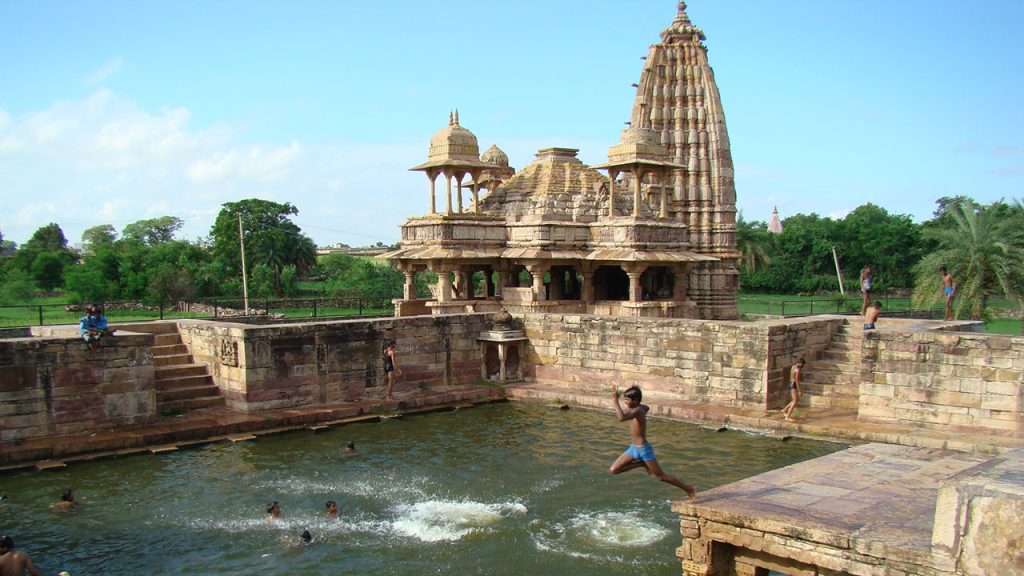
Tilasvan Mahadev Temple
Tilasvan Mahadev Temple is a sacred gem that holds a special place in the religious and cultural fabric of the region. This ancient Hindu temple is dedicated to Lord Shiva, one of the principal deities in the Hindu pantheon, and it exudes an aura of divinity and serenity that draws devotees and tourists alike.
The temple’s architecture is a testament to the rich heritage of Rajasthan. It showcases intricate carvings, ornate pillars, and an imposing spire that reaches towards the heavens. The temple is situated on the banks of the Banas River, creating a picturesque setting that enhances the spiritual experience. Devotees often perform ‘abhishek’ (ritual bathing) of the sacred Shiva Lingam, seeking blessings and purification.
Tilasvan Mahadev Temple is not only a religious site but also a cultural landmark, hosting various festivals and events throughout the year. Maha Shivaratri is celebrated with great enthusiasm, drawing a large congregation of devotees who engage in prayer, music, and dance.

Shahpura
Shahpura is renowned for its stunning palaces and havelis, each a testament to Rajput’s architectural brilliance. The Shahpura Haveli, a gem of the town, stands as an exquisite example of regal design, adorned with intricate frescoes, ornate courtyards, and elegant jharokhas. Surrounded by pristine lakes and lush landscapes, Shahpura offers a tranquil escape for nature enthusiasts. The serene waters of Lake Kachola reflect the azure skies and provide a picturesque backdrop for birdwatching and leisurely boat rides.
The town’s vibrant markets, where traditional Rajasthani crafts and textiles are sold, are a treat for shoppers. Shahpura’s cuisine is equally delightful, with mouthwatering local delicacies to savor.
In Shahpura, time seems to slow down, inviting travelers to immerse themselves in the enchanting beauty of Rajasthan’s heritage and natural wonders, making it a destination that truly encapsulates the spirit of India’s royal past and natural beauty.

Jahazpur
Jahazpur is a charming town known for its rich cultural heritage and picturesque landscapes, Jahazpur is a place that exudes history and natural beauty. The name “Jahazpur” translates to “Ship Town” in English, and it is said to have been given this name due to its boat-like shape that resembles a ship on a lake.
One of the prominent features of Jahazpur is the pristine Chandrabhaga Lake, which adds to the town’s allure. The serene waters of the lake reflect the clear blue skies and surrounding greenery, creating a tranquil ambiance for visitors. The lake is not only a sight to behold but also holds religious significance for the locals, drawing pilgrims during religious festivals.
Jahazpur is also home to historic temples and monuments, including the ancient Chandrabhaga Temple, which dates back centuries and stands as a testament to the town’s rich heritage. The architecture and intricate carvings on these temples showcase the craftsmanship of a bygone era. Visitors to Jahazpur can immerse themselves in the local culture, savor traditional Rajasthani cuisine, and partake in various festivities. The warm hospitality of the locals and the town’s timeless charm make Jahazpur a hidden gem in Rajasthan, perfect for those seeking a peaceful retreat in a culturally vibrant setting.

Asind
Asind is a picturesque town located in the Bhilwara district, known for its rich historical heritage and natural beauty. Nestled amidst the Aravalli hills, Asind exudes an old-world charm that transports visitors to a bygone era. This town, with its roots in history dating back centuries, is a captivating blend of cultural traditions and natural splendor.
One of the prominent attractions of Asind is its majestic Asind Fort, a testimony to the region’s historical significance. This fort, perched atop a hill, offers stunning panoramic views of the surrounding landscapes. It’s a testament to the architectural prowess of the past, with its intricate designs and sturdy fortifications.
Nature enthusiasts are drawn to Asind for its tranquil surroundings. The lush greenery and serene lakes create a serene environment, making it an ideal place for leisurely walks and bird-watching. The seasonal changes in the flora and fauna of the region make it a delight for photographers and wildlife enthusiasts.
The town is also renowned for its vibrant culture and festivals, showcasing the traditions of the Bhilwara region. The warm hospitality of the locals and their colorful attire add to the town’s charm, making it an enriching cultural experience.

Menal Waterfall
Menal Waterfall is a natural wonder that captivates visitors with its enchanting beauty and serene ambiance. This cascading masterpiece of nature is a hidden gem, offering respite from the arid landscapes of Rajasthan. The waterfall is a pristine marvel, set amidst lush greenery and rugged cliffs, creating a surreal oasis in the desert state. As you approach Menal Waterfall, you’ll hear the soothing sound of rushing water, beckoning you to its source. The waterfall, which originates from the Kothari River, tumbles down from a height of approximately 150 feet, creating a breathtaking spectacle. The clear, cool waters flow through a series of natural rock formations, adding to the overall allure of the place.
Visitors can explore the area around Menal Waterfall, which includes ancient temples and architectural remnants that stand as a testament to the rich history of the region. The site is not only a natural wonder but also a cultural and spiritual hub. The temples, dedicated to Lord Shiva and Lord Ganesha, add a spiritual aura to the surroundings.
Menal Waterfall is a popular destination for nature enthusiasts, photographers, and those seeking a tranquil escape. The lush vegetation, the glistening waters, and the historical significance make it a place of immense beauty and cultural importance, ensuring a memorable and immersive experience for all who visit.
Jataun ka Mandir
Jataun Ka Mandir is a sacred Hindu temple and this historic temple is an architectural gem and a place of great religious significance. Nestled amidst the Aravalli hills, it exudes an aura of tranquility and spirituality that draws pilgrims and tourists alike.
This temple is for Lord Shiva, a Hindu god. Its name, “Jataun Ka Mandir,” is derived from the term “Jataun,” which refers to Lord Shiva’s matted hair. The temple’s unique architecture is a testament to the rich cultural heritage of the region. Its intricately carved stone walls and ornate sculptures exemplify the traditional Rajasthani architectural style.
As visitors approach the temple, they are greeted by a sense of serenity and devotion. The temple complex also houses a sacred pond, offering devotees an opportunity to take a holy dip and purify their souls.
Jataun Ka Mandir is not only a place of worship but also a symbol of Rajasthan’s rich history and cultural diversity. Its spiritual ambiance, stunning architecture, and natural surroundings make it a must-visit destination for anyone seeking solace and a glimpse of India’s cultural heritage. It stands as a testament to the enduring devotion of its patrons and the timeless beauty of Indian temple architecture.
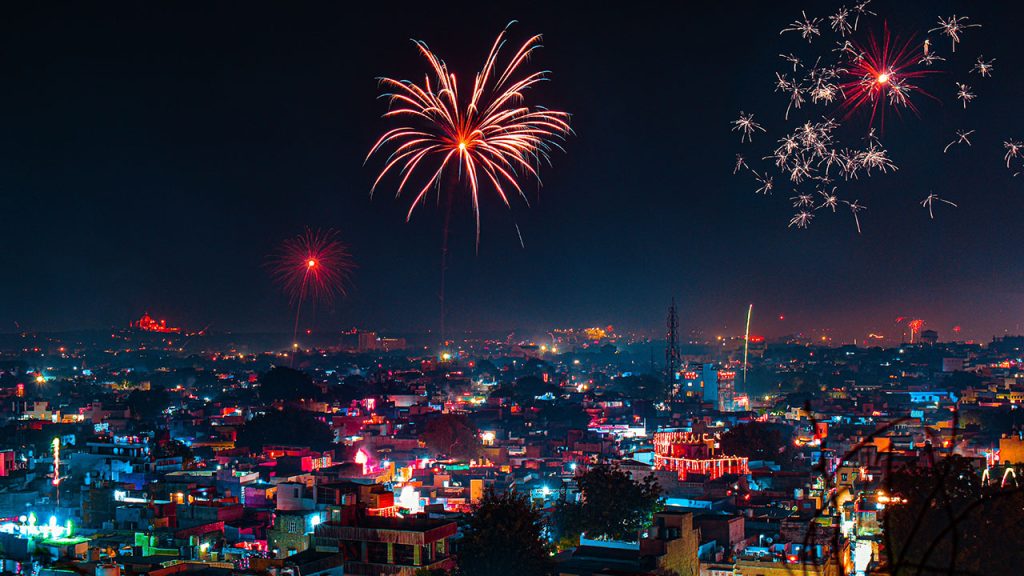
Cultural Delights
Festivals in Bhilwara
Bhilwara, a city located in the Indian state of Rajasthan, is not just known for its rich history, but also for its colorful and vibrant festivals. The city is a melting pot of cultures, and its festivals reflect the diverse and harmonious coexistence of its residents. From religious celebrations to cultural extravaganzas, Bhilwara’s festivals offer a unique and captivating experience that attracts visitors from all over the world.
Diwali: The Festival of Lights
Diwali, the festival of lights, is one of the most widely celebrated festivals in Bhilwara. The entire city comes alive with the warm glow of lamps and candles, creating a mesmerizing atmosphere. People decorate their homes with colorful rangoli designs and exchange gifts with their loved ones. The city’s streets and markets are adorned with colorful lights, and fireworks light up the night sky. Diwali in Bhilwara is a time for family gatherings, feasting on traditional sweets, and seeking the blessings of deities for a prosperous year ahead.
Holi: The Festival of Colors
Holi, the festival of colors, is another major celebration in Bhilwara. This joyous and playful festival is marked by people smearing each other with colored powders and water balloons. The vibrant colors of Holi symbolize the triumph of good over evil and the arrival of spring. Communities come together to celebrate, and the atmosphere is filled with music, dance, and laughter. Traditional Rajasthani folk songs and dances add to the festive spirit, making Holi in Bhilwara an unforgettable experience.
Gangaur: Celebrating Women and Marriage
Gangaur is a prominent women-centered festival in Bhilwara, celebrating the goddess Gauri, an embodiment of marital bliss and fertility. The festival spans several days and involves elaborate processions of women carrying clay idols of Gauri on their heads. These idols are beautifully adorned with colorful attire and jewelry. The processions are accompanied by traditional music and dance, and the streets come alive with the rhythm of folk songs. Gangaur is a tribute to the strength and beauty of women and reflects the deep-rooted cultural values of the region.
Makar Sankranti: The Kite Festival
In January, Makar Sankranti celebrates the sun’s Capricorn coronation. It is also known as the kite festival. Bhilwara skies are adorned with colorful kites of all shapes and sizes. People compete to cut each other’s kites in a friendly yet intense competition. The cityscape is transformed into a sea of kites, and the sound of laughter and cheering fills the air. Makar Sankranti is a time for bonding, as families and friends come together to participate in this exhilarating tradition.
Navratri and Dussehra: Devotion and Victory
Navratri and Dussehra are celebrated with great fervor in Bhilwara. Navratri involves nine nights of dance, music, and worship of the goddess Durga. Colorful attire, elaborate decorations, and traditional dance forms like Garba and Raas make these nights come alive. Dussehra commemorates the victory of Lord Rama over the demon king Ravana and is marked by the burning of the effigies of Ravana. The entire city gathers to witness the grand spectacle, and it is a time for reflection on the triumph of good over evil.
Bhilwara Handloom and Handicrafts Fair
Bhilwara’s handicrafts and textiles take center stage during local fairs and festivals. The most significant of these is the Bhilwara Handloom and Handicrafts Fair, which attracts artisans and visitors from all over India. This fair serves as a platform for craftsmen to showcase their skills and products, creating opportunities for trade and cultural exchange. The products, especially textiles, are exported to various parts of India and the world, bringing in valuable foreign exchange and contributing to the growth of the Indian textile industry.

Handicrafts and Textiles of Bhilwara
Bhilwara, a picturesque city located in the northwestern state of Rajasthan, India, is not only renowned for its historical significance but also for its rich tradition of handicrafts and textiles. The city’s artistic heritage has been passed down through generations, and today, Bhilwara stands as a hub for exquisite handcrafted goods and high-quality textiles that are celebrated both nationally and internationally.
Textiles of Bhilwara
Bhilwara is often referred to as the “Textile City of India” due to its significant contribution to the textile industry. The city’s textile heritage dates back centuries, and it is a major center for the production of high-quality fabrics, primarily cotton and wool. Bhilwara is known for its intricately woven fabrics, which are used in traditional attire, home furnishings, and more.
One of the most famous textile products from Bhilwara is the ‘Lepcha’ style saree. Lepcha sarees are characterized by their unique designs and vibrant color combinations. These sarees are adorned with intricate embroidery and mirror work, which adds a touch of elegance to the attire. The skilled artisans of Bhilwara handcraft these sarees with immense precision and care.
Bhilwara Handicrafts
In addition to textiles, Bhilwara is also known for its exquisite handicrafts. The region boasts a rich tradition of handcrafted items that reflect the artistic talent of its people. Some of the most notable handicrafts include:
Wooden Crafts: Bhilwara artisans are skilled in creating wooden items such as furniture, toys, and decorative pieces. The woodwork is often adorned with intricate carvings and designs, showcasing the artisan’s dedication to their craft.
Pottery: The city is also famous for its pottery, with pottery items ranging from utilitarian to decorative. The artisans mold clay into various shapes and designs, which are then adorned with vibrant colors and patterns.
Metalwork: Bhilwara’s metalwork includes items like jewelry, utensils, and decorative pieces. Silver and brass are commonly used metals for crafting exquisite pieces that often feature intricate designs.
Embroidery: Embroidery is an integral part of Bhilwara’s handicraft tradition. Skilled artisans embroider fabrics, clothing, and accessories with a variety of intricate designs, incorporating elements of the region’s cultural heritage.
Block Printing: Block printing is another art form that thrives in Bhilwara. Skilled craftsmen use wooden blocks to create beautiful patterns on fabrics. This technique, known as ‘Sanganeri’ printing, produces vibrant and long-lasting designs. These printed textiles are often used in making traditional Indian attire like sarees, salwar suits, and dupattas.

Art and Music of Bhilwara: A Cultural Tapestry
The city of Bhilwara boasts a rich tapestry of art and music that reflects the cultural heritage of the region. Bhilwara, with its vibrant traditions and historical significance, is a hub of creativity and artistic expression. The art and music of Bhilwara play a pivotal role in preserving the cultural identity of the region, and they continue to enchant both locals and visitors alike.
Art in Bhilwara
Bhilwara’s artistic heritage is deeply rooted in the traditional crafts and handiwork of the region. The city is renowned for its exquisite handloom industry, particularly the production of Bhilwara fabrics. These fabrics are celebrated for their intricate designs and vivid colors, and they have gained international recognition. The art of fabric weaving has been passed down through generations, and local artisans still employ age-old techniques to create these masterpieces.
One of the most iconic artistic traditions in Bhilwara is the Phad painting. These paintings are unique narrative scrolls that depict stories from Hindu mythology, particularly those of local deities like Pabuji and Devnarayan. Phad artists use vivid colors and fine detailing to bring these tales to life, often with striking visuals and intricate storytelling. These paintings are not only a visual treat but also a cultural treasure that reflects the spirituality and beliefs of the people.
Bhilwara is also known for its thriving pottery industry. Skilled potters craft a wide array of utilitarian and decorative pottery, which showcases the local flavor. The pottery is often adorned with intricate designs and vibrant colors, making them popular souvenirs and collectibles.
Music in Bhilwara
Music has always been an integral part of Bhilwara’s cultural fabric. The folk music of the region is a reflection of the joys, sorrows, and daily life of the Bhilwara people. Traditional instruments like the dholak, harmonium, and shehnai are commonly used in local musical performances.
One of the most popular folk music genres in Bhilwara is Bhawai, a vibrant and rhythmic form of expression. Bhawai performances involve the balancing act of performers who dance on a narrow wooden board and sing in tune with the music. The grace and agility displayed by the artists make Bhawai a captivating experience for the audience.
Another noteworthy musical tradition in Bhilwara is the Manganiar and Langas, two distinct communities of musicians. The Manganiars are known for their captivating Sufi and folk music, often accompanied by the soulful tunes of the kamayacha (a bowed instrument) and the melodious vocals. The Langas, on the other hand, specialize in songs that recount historical events and legends, played on the sarangi and dholak. Both of these musical traditions are deeply ingrained in the cultural tapestry of Bhilwara.
In addition to folk music, Bhilwara also celebrates classical Indian music. The city hosts various classical music festivals, attracting renowned artists from across the country. These events showcase the exquisite beauty of classical Indian music, offering a blend of both traditional and contemporary renditions.

Gastronomic Journey of Bhilwara
The local cuisine of Bhilwara, a vibrant city in the Indian state of Rajasthan, offers a delightful journey through the flavors and traditions of this region. Bhilwara’s culinary heritage is a reflection of its rich history, culture, and the arid landscape of Rajasthan.
One of the most prominent aspects of Bhilwara’s cuisine is its vegetarian nature. The city’s gastronomy is characterized by an array of delectable vegetarian dishes that incorporate locally grown produce such as pulses, millets, and fresh vegetables. A quintessential Bhilwara meal often includes staples like dal bati churma, a combination of lentil curry, baked wheat flour balls, and crushed wheat mixed with jaggery and ghee.
The local cuisine also boasts a diverse range of snacks and sweets, including the famous pyaaz ki kachori, a deep-fried pastry stuffed with spicy onion filling, and the sweet treat known as moong dal halwa. Bhilwara’s culinary traditions are deeply rooted in its Rajasthani heritage, where the use of aromatic spices and ghee is prevalent, infusing each dish with a burst of flavors.
When in Bhilwara, you can savor these dishes at traditional eateries, street food stalls, and even in the homes of locals, where the warmth of hospitality blends seamlessly with the richness of the local cuisine. Bhilwara’s local cuisine is a testament to the culinary diversity that makes Rajasthan a gastronomic treasure, offering an unforgettable experience for food enthusiasts.
Moreover, Bhilwara’s local cuisine is renowned for its adaptability to the region’s harsh climate. The scorching summers and chilly winters have influenced the choice of ingredients and cooking methods. Dishes like gatte ki sabzi, which consists of gram flour dumplings in a spiced yogurt gravy, or ker sangri, a dish made from desert beans and dried berries, are perfect examples of how the cuisine here utilizes ingredients that thrive in arid conditions.
The street food scene in Bhilwara is equally enticing, with vendors serving up mouthwatering treats like mirchi bada (spicy green chili fritters) and kachori, making the local food culture accessible and beloved by residents and visitors alike. The city’s bustling bazaars and food markets are great places to explore these culinary delights.
Bhilwara’s cuisine is not just about satisfying your taste buds; it’s also a cultural experience. Many restaurants and eateries showcase traditional folk performances, like the Ghoomar dance, while you dine. This adds an extra layer of authenticity to your culinary adventure, allowing you to immerse yourself in the rich culture of Bhilwara.
The culinary traditions of Bhilwara extend beyond the city limits, spilling into the rural areas and surrounding villages. Here, you’ll find an even more authentic and rustic side to the local cuisine. Villagers often prepare traditional dishes using age-old recipes passed down through generations. These meals are characterized by simplicity and reliance on locally available ingredients, showcasing the resourcefulness of the people.
One such dish that epitomizes the rural charm of Bhilwara’s cuisine is “makki ki roti” and “sarson da saag,” a combination of corn flatbread and mustard greens cooked with spices. It’s a testament to the agricultural roots of the region. Similarly, “bajre ki khichdi,” a pearl millet porridge, is a hearty and nutritious dish enjoyed by many in the villages.
The cuisine also adapts to various festivals and celebrations, with special dishes prepared during occasions like Holi, Diwali, and weddings. Sweets, in particular, hold a special place in Bhilwara’s culinary heritage, with desserts like malpua, a sweet pancake, and ghewar, a sweet deep-fried disc, being popular choices during festive seasons.
Accommodation Options
Bhilwara, a charming city located in the Indian state of Rajasthan, offers a diverse range of accommodation options to cater to the needs of both tourists and business travelers. This city, known for its rich textile heritage and vibrant culture, ensures that visitors have a comfortable and enjoyable stay. Here are some of the accommodation options you can find in Bhilwara:
Hotels: Bhilwara boasts a selection of hotels ranging from budget to luxury. These hotels provide comfortable rooms, essential amenities, and warm hospitality. You can choose from well-known national chains or local establishments, depending on your preferences and budget.
Guest Houses: Many guest houses in Bhilwara offer a more homely atmosphere. They are a good choice for travelers seeking a cozy and affordable place to stay. Guest houses often provide basic amenities and an opportunity to interact with local residents.
Resorts: For those looking for a more luxurious and tranquil experience, Bhilwara offers several resorts. These properties are often set in serene surroundings, offering well-appointed rooms, fine dining, and various recreational facilities. They are perfect for a relaxing vacation.
Heritage Hotels: Bhilwara has a few heritage properties that showcase the region’s rich cultural and historical heritage. Staying in these hotels can be a unique experience, as they often retain their old-world charm while providing modern comforts.
Homestays: To get a taste of Rajasthani culture and hospitality, consider staying in a homestay. Local families open their homes to travelers, offering a chance to experience authentic food and traditions. It’s an excellent way to immerse yourself in the local way of life.
Service Apartments: Business travelers and families often opt for service apartments, which offer a blend of comfort and functionality. These fully furnished apartments come with kitchen facilities, making them ideal for extended stays.
Budget Accommodations: Bhilwara also has a variety of budget-friendly options like hostels and lodges. These are suitable for backpackers and cost-conscious travelers, providing essential amenities at a reasonable price.
Camping: For nature enthusiasts, there are camping options in and around Bhilwara. Campsites near lakes and nature reserves allow you to enjoy the great outdoors while experiencing a different side of Rajasthan.
It’s advisable to book your accommodation in advance, especially during peak tourist seasons, to ensure you have a comfortable and enjoyable stay in Bhilwara. Whether you’re visiting for business or leisure, the city offers diverse accommodation options to suit your preferences and needs.

How to Reach Bhilwara
Bhilwara, a city known for its rich history and vibrant culture, is nestled in the heart of Rajasthan, India. If you’re planning a journey to this enchanting destination, you’ll likely be starting your adventure in Udaipur. To help you reach Bhilwara with ease, we’ll guide you through the options, including the best taxi services in Udaipur.
By Air
The nearest major airport to Bhilwara is Maharana Pratap Airport in Udaipur. It’s well-connected to major cities in India, making it a convenient entry point for travelers. Upon landing in Udaipur, you can hire a taxi to Bhilwara. If you’re looking for the best taxi service in Udaipur, consider booking a reliable and professional taxi service that will ensure a comfortable and safe journey to Bhilwara.
By Rail
Bhilwara has its own railway station, known as Bhilwara Railway Station (BHL). It is well connected to major cities in India, including Ajmer, Delhi, Mumbai, Jaipur, and Udaipur. You can check the train schedule and book tickets through the Indian Railways website or at the station. Jaipur to Bhilwara distance by train is 267 km and there are several trains that connect them. The best option to travel from Udaipur is Udaipur to Bhilwara train which is only 162 km and takes 2 hours and 30 minutes to reach.
By Road
For those who prefer a road trip, you can take the scenic route from Udaipur to Bhilwara by hiring a taxi. Udaipur to Bhilwara is approximately a 3 to 4-hour drive, depending on traffic and road conditions. You can choose from various taxi services in Udaipur that offer both one-way and round-trip options. A professional taxi service will ensure that you reach Bhilwara comfortably and in a timely manner.
Tour Operators in Udaipur
If you want to make the most of your journey to Bhilwara and explore the region’s historical and cultural attractions, you can also consider contacting a tour operator in Udaipur. These operators offer customized tour packages that include transportation to Bhilwara, guided tours, and more. They can help you plan a memorable and well-organized trip to Bhilwara and its surrounding areas.
In conclusion, reaching Bhilwara from Udaipur is a straightforward process with multiple transportation options. Whether you choose to travel by air, train, or road, there are excellent taxi services in Udaipur to make your journey comfortable and convenient. Additionally, tour operators in Udaipur can help you create a comprehensive travel experience in Bhilwara, ensuring that you explore this beautiful city to the fullest. Enjoy your journey to Bhilwara and immerse yourself in the magic of Rajasthan.
Useful Information for Travelers in Bhilwara
Bhilwara, a vibrant city in the Indian state of Rajasthan, is known for its rich cultural heritage, historical landmarks, and picturesque landscapes. Whether you’re a tourist seeking to explore its beauty or a business traveler in town, here’s a comprehensive guide with useful information to make your trip to Bhilwara a memorable and hassle-free experience:
1. Transportation
– Air Travel: Bhilwara doesn’t have its own airport, so the nearest major airport is Jaipur International Airport, approximately 170 kilometers away. From there, you can hire a taxi or take a bus to reach Bhilwara.
– Train: Bhilwara Junction is well-connected to various cities across India. You can check the train schedule and book tickets through the official Indian Railways website.
– Road: Bhilwara is accessible by road, and you can reach it by car or bus. The city is well-connected with major highways and state roads.
2. Accommodation
– Bhilwara offers a range of accommodation options, from budget hotels to luxury resorts. Some popular choices include Hotel La Abode, The City Pride Hotel, and Ranbanka Heritage Resort.
3. Local Cuisine
– While in Bhilwara, don’t miss the opportunity to savor the local Rajasthani cuisine, which includes dishes like dal bati churma, gatte ki sabzi, and kachori. You can find these delicacies at local restaurants and street vendors.
4. Places of Interest
– Bhilwara is steeped in history and culture, with attractions like the Harni Mahadev Temple, Meja Dam, Menal Waterfall, and Pur Udan Chatri. Make sure to explore these sites to understand the city’s heritage.
5. Shopping
– Bhilwara is renowned for its textile industry, especially its hand-crafted textiles, and fabrics. The city’s markets, like the Pur Road Market and Ghantaghar Market, are ideal places to buy traditional Rajasthani clothing, including Bandhej and Leheriya sarees.
6. Local Festivals
– If your visit coincides with local festivals like Holi or Diwali, don’t miss the chance to experience the vibrant celebrations and cultural performances.
7. Language
– The primary language spoken in Bhilwara is Rajasthani, but Hindi and English are widely understood and spoken in hotels, restaurants, and among the educated population.
8. Safety
– Bhilwara is generally considered a safe city for travelers. However, it’s advisable to take standard precautions like safeguarding your belongings and being cautious during late-night outings.
9. Bhilwara Weather
– Bhilwara experiences a hot and dry climate during the summer months (March to June), with temperatures often exceeding 40°C. The best time to visit is during the cooler winter season (October to February).
10. Currency and Banking
– The official currency is the Indian Rupee (INR), and you’ll find several banks and ATMs in the city for currency exchange and cash withdrawals.
Remember to plan your trip to Bhilwara well in advance, considering the weather and local festivals, to make the most of your visit. With this useful information, you’re well-equipped to explore the charms of this historical city in the heart of Rajasthan.

